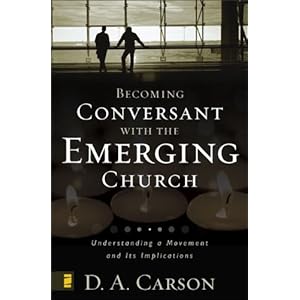
Ok, so this book has been out for a while - five years - which is a long time in the postmodern culture where things change so very quickly. Nevertheless, I am in Northern Ireland, where things move just a bit slower, and the church scene isn't changing to the same extent as the United States or even on the British mainland.
As with another of Don Carson's books, this began from a series of public speaking engagements which were subsequently written and published. In this case, including massive expansion of the topics discussed, and in response to feedback and criticism of his original lectures. And as with all of Carson's books, it's well researched, thorough, and considered material that is published and made available to the wider church.
The book begins with a consideration of just what is meant by the emerging church (or emergent church, depending on who you're listening to or reading). At the heart of the movement, Carson argues, is the conviction that 'changes in the culture signal that a new church is 'emerging'. That because the culture we live in is changing, then we should change how we do church, to be able to reach the postmodern generation who reject modernism and any absolute truth.
Carson isn't fully supportive of the emerging church, and what some of its more prominent spokesmen have been saying and writing. Yet he is completely fair, and first looks to the positive features of the movement - their reading the times and wanting to do something about it, pushing for authenticity, having a desire to evangelise, and probing tradition. Yet even these positives aren't enough to swallow the emerging church's line completely - despite these positives, they seem to have several limiting weaknesses.
Don argues that the problem is that the emergings are so completely sold on postmodernism that they fail to see the positive effects of modernism (including the benefits that led to the possibility of postmodernism, and may already be behind the times as postmodern was (even in 2005) considered passe by many academics!
Carson obviously deals with these topics more thoroughly and competently than I'm managing in this short article, but allow me to quote one excellent rebuke of leading emergent, Brian McLaren:
McLaren says 'When we "do theology", we are... ants discussing the elephant. At some level of profundity and accuracy, we are bound to be inadequate or incomplete all the time, in almost anything we say or think, considering our human limitations, including language, and God's infinite greatness... Our words will seek to be servants of mystery, not removers of it as they were in the old world.' (The Church on the Other Side, pp65, 89)
Carson's response is priceless:
'Here it is again: the absolute antithesis. Either we can know God exhaustively, or we are restricted to the mysterious. Of course it is always true that we cannot know God exhaustively: we are not omniscient. God is infinitely greater than we are. Moreover, the best of the modernist theologians were among the most adamant on this point. It did not take postmodernism to discover that God is infinitely greater than we and in that sense forever remains mysterious. But although the comparison of elephant and ants is helpful at one level, it overlooks the fact that in this case the ants have been made in the image of the elephant, and this elephant has not only communicated with the ants in ant-language, but has also, in the person of his Son, become an "ant" while remaining an "elephant". If the ants were left on their own to figure out what the elephant knows and thinks and feels, "mystery" would be too weak a word. Yet in the case of the revealing elephant with whom we have to do, he has told us ants what he is like, what he thinks, what he feels, what he has done, and what he is going to do - not exhaustively, of course, but truly.'
At some points, the discussion was slightly heavy, and at times philosophical, but necessarily so. While Carson's humour and wit sparkles throughout, perhaps his strongest section is the final chapter, in which he does what he does best - Bible exposition, as he unpacks 2 Peter 1, on truth and experience. So often, we think of them in competition, contrary to each other, but actually, the best stand together in the appropriate way in the gospel, as seen in the life of the apostle Peter. Emergents need truth as well as experience - perhaps then they can truly evangelise postmoderns while being faithful to the Bible.
A good read, particularly for those thinking about reaching out to our culture, maybe especially in youth/student/college settings, and for church leaders in 'traditional' denominations struggling to understand the emerging churches.
No comments:
Post a Comment